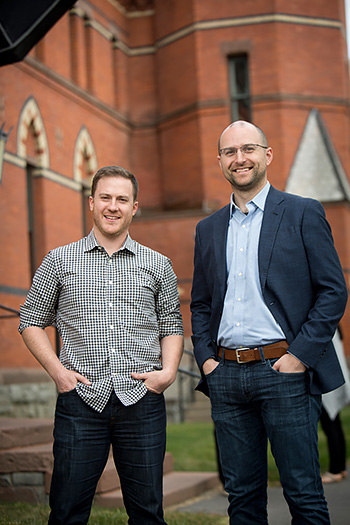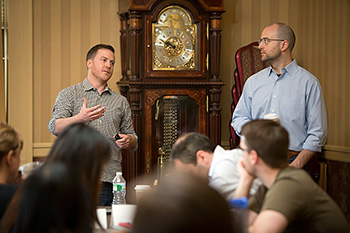Alumni lead biotech startup GeneWEAVE to successful acquisition

Diego Rey, Ph.D. '12, left, and Jason Springs, MBA '09, co-founders of GeneWEAVE, on the Cornell campus in September. Photo: Jason Koski/University Photography.
Two Cornell alumni who developed a diagnostic technology to detect drug-resistant bacteria while they were students have sold the startup they launched to Roche, the world's largest biotech company. Roche acquired GeneWEAVE for $425 million.
The acquisition calls for Roche to pay GeneWEAVE $190 million up front and up to $235 million based on the achievement of product-related milestones. The deal was announced in August.
The company's co-founders, Jason Springs, MBA '09, and Diego Rey, Ph.D. '12, met in 2007 at Cornell after they both independently approached Wesley David Sine, faculty director of the Entrepreneurship and Innovation Institute at the Samuel Curtis Johnson Graduate School of Management. Both told him they wanted to work with another graduate student on starting a company. After Sine introduced the two entrepreneurs, they immediately began collaborating on their joint venture, eventually raising $25 million in venture capital to finance the startup.
"Unequivocally, if I had not been at Cornell, this wouldn't have happened," Springs says. "I feel very strongly about that. There's no one thing that I can point to as the pivotal thing that made it happen. It's an ecosystem or culture that allows people to do these things without burden. It takes a village to raise a company."
Springs and Rey visited campus in September to tell the story of their company to Sine's class, Commercializing University Science and High Technology – a course they both took as graduate students. During three days on campus, Springs gave a presentation on making a venture capital pitch and Rey joined a panel of scientists to discuss entrepreneurship, where he learned that two other panelists were inspired to start their businesses after hearing the GeneWEAVE story in Sine's class.
Inspiration is but a starting place on the journey of a company from idea to startup to acquisition, says Sine, who also is a professor of management and organizations at Johnson.
"The sale of GeneWEAVE is just one transaction," he says. "It's what Diego and Jason did together so that they had a company that Roche would want to buy. It's a long journey."
A number of Cornell faculty members aided Springs and Rey in gaining the skills to create a startup, including Zach Schulman, ILR '87, Law '90, who taught a course on law and high-growth businesses, and Brad Treat, MBA '02, Cornell's former entrepreneur-in-residence.

Rey and Springs speak to a Samuel Curtis Johnson Graduate School of Management class in September. Photo: Jason Koski/University Photography.
Sheer determination led to success
Their sheer determination to create a company was a major factor in their success. Springs, who had worked at Lockheed Martin, arrived on campus a full month before Johnson's orientation in summer 2007 so he could "contact every single professor on campus who had the word entrepreneurship linked to their name on any Cornell website."
At the same time, Rey was working on his thesis in biomedical engineering under professor Carl Batt, focusing on nanomaterials to target cancer cells, when he came up with an idea for a startup company. Rey wanted to create a clinical application that would detect bacteria but bypass the extensive sample preparation required to analyze DNA, a costly process that had become a bottleneck in diagnostics.
"I was fortunate to join a lab with such an interdisciplinary and entrepreneurial professor," Rey says.
By the time he met Springs in fall 2007, Rey had already started a company called Phagenetics with Leonardo Teixeira, Ph.D. '09. Teixeira was working in the same lab but moved back to Brazil. After Springs joined the team, he created a business plan that changed the focus of the startup from diagnosing tuberculosis to testing for drug-resistant bacteria. This has remained GeneWEAVE's core mission.
Technology developed at GeneWEAVE delivers DNA directly into the bacteria, which causes the organisms to light up when detected. The company's new Smarticles technology can also determine if the bacteria are susceptible to antibiotics.
While the technology is still in development, Rey says the target customer for the first product will be hospitals. Many have been fighting a strain of drug-resistant bacteria known as MRSA (methicillin-resistant Staphylococcus aureus).
"Because our technology allows users to skip sample preparation, the value our products bring can be very high, relative to their price," Rey says. "We want to get every hospital to use our tool."
In 2010, Rey and Springs moved GeneWEAVE to California after securing their first venture capital investment from Oakland-based Claremont Creek Ventures. Along with a second firm, X/Seed Capital, GeneWEAVE raised $1 million in its seed-funding round. By 2014, the startup had secured $25 million in venture capital financing.
Roche 'shared our vision'
As the startup grew, it began to attract the attention of larger companies, including Roche Molecular Diagnostics, the world leader in in vitro diagnostics. GeneWEAVE's top managers started discussions about the company's long-term goals with Roche, which operates a molecular diagnostics division.
"Roche shared our vision for solving the problem drug-resistant bacteria in hospitals," Springs says. "To us it was obvious that joining Roche would allow the combined teams to achieve our shared vision faster and with a much broader reach."
Proceeds of the acquisition of GeneWEAVE will be split among the startup's shareholders, founders, investors and employees. Rey and Springs now have new titles – head of research and head of marketing, respectively, of GeneWEAVE, a division of Roche Molecular Diagnostics. Roche has retained all of the company's employees.
While startups are typically either acquired or become public companies to allow investors to recoup their money, GeneWEAVE's sale to a company the size of Roche reflects the importance of the technology it has developed, says Tom Schryver '93, MBA '02, director of the Entrepreneurship and Innovation Institute.
"What these guys have done, through their hard work and the potential of their technology, is to take a significant amount of venture capital and turn it into something much more valuable," Schryver says. "There may be something of even greater value to come from it, which is what Roche is hoping will happen."
Sherrie Negrea is an Ithaca, New York, freelance writer.